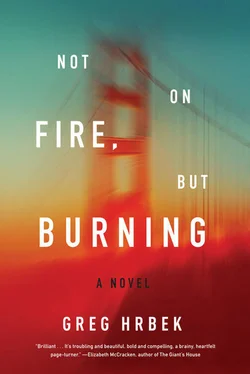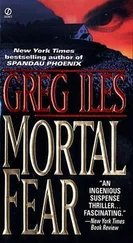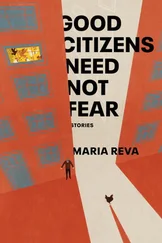The drug has grown soft.
Yassim holds the pipe and Karim smears the flower-sweet goo on the curved sides of the bowl. The boys pass the pipe, heating the drug until they can draw it into their mouths as smoke; once the process has been repeated until there’s nothing left but a gray ghost of resin, Karim says:
“Thazzit.”
“It.”
“Opeem,” he says. “Thizshithole. I cant bleeve izallover.”
“Cant bleeve it.”
“Cant bleeve it.”
“I wish,” Yassim says, “youka come withuss.”
“Me too.”
“Leeme seet.”
“Kikt,” Karim says, and hands the pipe to Hazem. Then, tearfully: “I wanna come widjuguys.”
Hazem says: “You are cominwidjuss. Juzza matturahtime.”
The three orphans lie back on the cool tile floor; and as each one feels his soul levitating just above his physical self, he thinks of the sheikh, Abdul-Aziz, who has said to them, “You may be going your separate ways now, my sons, but very soon you will be together in the highest gardens of heaven. It is just a matter of time.” Each boy contemplating the same thing in his state of flotation: That for which he is destined. Paradise. And wondering. Will Paradise feel as good as this? But thinking also of what must come first. Is it true what the sheikh says? That if we lay our life down in the path of God, we will feel nothing when our body explodes. Can dying be so easy? But even if it’s hard, even if dying hurts very much. To feel like this after. Forever. Matter of time to feel like this foreverafter. To float above the physical world and dream. To be with your family again … Karim reaches into the pocket of his short pants. Touches the eyeglasses. The lenses are gone — the ovals of curved glass which helped her see clearly have cracked and broken into tiny pieces (scattered now, who knows where) — and one of the temple arms has broken off. But what remains, the shape of the plastic frame, helps Karim remember his mother’s face.
Hold it before your eyes. Remember her eyes. Then fold down the temple arm and return it to your pocket. The only memento.
Two days later, dressed in new donated clothes given him by the nuns (a pair of corduroys worn smooth at the knees; a collared shirt, bright red, with an alligator stitched onto the left breast; a pair of tennis sneakers), he sits in a bus painted the blue of a bruise and rides out of the camp and onto a road so straight it might have been drawn on the plains with a ruler. The window of his seat is pushed up. A breeze comes through. On the horizon, he can see a rainstorm: a dark cataract of water plunging from a thunderhead as massive as an intergalactic mothership. The camp, that divided city, is already out of sight. And Hazem and Yassim. Won’t ever see them again in this world. Next week, they leave for the Michigan Territory. A shelter for Muslim-American youth where they can surely score Dream and probably play soccer all the live-long day while you, in some heathen suburb, are getting the agonies and the shit kicked out of you. Karim shuts his eyes and rests his left temple against the window sash. The wind goes right up his nose; it’s like drowning. Like that time a couple years back when they were playing war and he was the terrorist and they tipped him back on a board and poured water into his breathing passages. One of his friend’s mothers found out about that episode and told the other parents and he and his crew got the tongue-lashing of a lifetime. You think torture is a game and so on. Well, yeah. They did, actually. Though looking back now, Karim can sort of see their point. When you’re seven, eight, you make plastic explosives from Play-Doh and fill up matchboxes with rusty nails and tape it all onto a belt and it’s a fucking breeze to kill yourself. Then, one day, you’re eleven, twelve, and you’re a part of something real, more important than childhood, and more important than yourself.
“Him?”
“Yes,” the nun says. “The boy in the red shirt.”
“Jesus Christ Christian …”
They are standing at a window looking out on a fenced, razor-wired area, like the exercise yard of a prison. His adopted son has just walked off a bus. A kid at least ten pounds underweight. Whose flesh looks mildewed. Who’s hugging himself around the midriff as if to keep his guts from spilling out.
“I thought you knew,” the nun asks.
“Yeah, but.”
“But he’s just a boy, I know. Come, I’ll introduce you.”
Out of the building and across the dirt lot. When they get close, the kid sees them and forces himself to stand straighter.
Will has had a lengthy inner debate about conduct in this moment. It’s about the kid, not you. Empathy. Big picture. Imagine you’re three years old and you and your family get packed onto a cattle car and shipped off to a slum with no exit; eight years later, you’re the only one left, and some old white guy comes out of nowhere and expects you to call him father. Be cool and take it slow.
The nun says, “Hello, Karim.”
“Hi, Sister.”
“Karim, this is Mr. Banfelder.”
The kid looks up at Will with eyes big and tear-filled. Not crying, exactly. It’s a symptom of withdrawal.
Will kneels down in front of him and says: “You’re a Dream addict.”
“Yessir.”
“How’d you get the stuff.”
He shrugs and hugs himself harder.
Will reaches into the breast pocket of his coat and takes out a pack of greens. He shakes one out and hands it to the kid, then produces a disposable lighter, and the nun says:
“Mr. Banfelder …”
“Sister, I’ve seen this before. I knew a guy once, back when I served, who got into this shit. Said he never coulda kicked if it wasn’t for grass.”
He lights the cigarette.
The kid sucks and exhales. Shivers. Wipes his eyes.
“How long?”
“Five months, I guess.”
Will nods and lets the kid take a few more drags. “Feel any better?”
“A little.”
“Mr. Banfelder, I don’t think—”
“Opinion noted, Sister. But Karim is my responsibility now. Legal guardianship and all that jazz.”
The nun gives a kind of smile. Then she says her goodbye to the kid, a hug and a kiss on the cheek; then she shakes Will’s hand and is off to her next good deed. Which leaves the two of them.
“You called me ‘sir,’ ” Will says.
“Yessir.”
“Don’t do that.”
“Okay,” says Karim. “So, what then?”
“You know Arabic?”
He nods.
“How about ‘jaddi.’ ”
The kid looks at him and wipes his eyes again. “ You speak Arabic?”
“Na’am.”
“Jaddi,” the kid says. “Like, grandfather.”
“That make sense?”
“Sure.”
“Okay, then. Jaddi it is. Finish the smoke and let’s go. It’s an hour to Sioux City. We’ll get you some vitamins and a milkshake.”
The trip to New York is hell. Although Karim has been through this before (several times since he started using), every other time he’s had the agonies he lay still on the mattress in the half-light of the lean-to — Hazem and Yassim with him, all of them on the twin mattress like a litter of whining dogs — until withdrawal had become a state of suspended animation. You sort of forget you’re alive. But this time. The world racing past the window at impossible speed, the glare of the sun, the heat of the sun and the chill of the air conditioning, the stink of a cattle farm. (How can something possibly smell worse than that open sewer by the lean-tos?) But the speed is the worst part. Even when he closes his eyes, he can’t rid himself of the sense that nothing outside the window is staying still. Somewhere on the first day, they get pulled over by soldiers in desert camo — and even though the old guy has got stamped papers, they search the car. They pull up the false floor of the trunk and take out the spare tire. Then they make Karim remove all his clothes right there by the side of the highway. Though he is finally stationary, the motion of the car won’t leave his head and he pukes up the milkshake from Sioux City. That night, they stay in a motel with two beds, where Karim, curled fetally in the clean sheets, feels like he’s adrift on a lifeboat. He drifts off and has a dream in which the camp hospital is heaven. His mother, wearing the jilbab she died in, looks as though she has waded waist-deep into a river of blood. Yet her eyes are open, and she’s squinting — and saying: Karim, is that you? Where have you been, habibi? You have my eyeglasses. He wakes up and it takes him a long space to understand where he is. Not heaven, not yet. Not the lean-to. Then he hears the old guy in the other bed, making a sound in his sleep like a flooded car engine. After this, he can’t sleep. Feels like there’s something inside him, clawing at the dead shell of his self, trying to split him apart and get out. Perhaps this is your soul. He lies awake, thinking of the sheikh. Dark beard with twisting hairs, a beard of thorns.
Читать дальше












